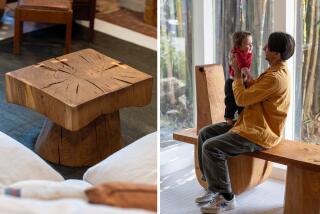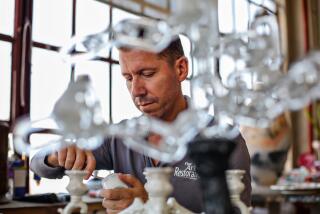A Woodworker’s Ingrained Truth
If this is the age when anything is possible, isn’t it peculiar how narrowly we define the bounds of success in pursuing it?
Those who set the cultural trends are decidedly single-minded about the proper trajectory for “making it” just now: Parents must do anything they can -- apparently quite literally anything -- to get their children into the best nursery schools. If one’s weight and age add up to 20, it’s high time to get started. A day lost from the rat race is a day falling behind. From there, the pell-mell journey travels a narrow gauge: college prep in elementary school, SAT strategies in middle school and the go-for-broke admissions competition to ranking universities, perhaps with some athletics or theater thrown in for the chance of hitting it big or rounding out the resume.
After that? Well, we all know what achievement means, don’t we?
Americans laugh at arranged marriages in different cultures. They think nothing, though, of arranging the other essentials for their children’s lives.
With this on my mind, I have traveled to a lemon orchard at the base of Southern California’s Mt. Baldy in the community of Alta Loma. I’m here to meet a man who has been a hero for years. His name is Sam Maloof. He is 86. He took a different path. He enrolled in a shop class in middle school.
For most of his life since, from planks of figured hardwood, chiefly walnut, he has found purpose, satisfaction, beauty and comfort.
If his name doesn’t ring a bell, he calls himself a woodworker. In a show of his creations, the Smithsonian called Maloof “America’s most-renowned contemporary furniture craftsman.” He is best known for his sculpted rocking chairs with elongated, sweeping rockers and compound joinery. To me, he is an exemplar.
At auction, a Maloof rocker has fetched $140,000. You can get one for only five figures if you’re willing to endure his long waiting list. He works in his woodshop every day with near-ageless vigor but never fast enough to meet demand.
But money is only one point. It proves merely that Maloof’s path can lead to bottom-line financial rewards the same as the MBA, DDS or MD. More interesting are the many ways in which Maloof is not the same.
He chose not to become a furniture industrialist and expand beyond a few shop assistants. He chose not to franchise his name to those who would market inferior copies in discount stores, even when offered millions to do so.
Yet he freely shares his techniques and philosophy with those who ask. Among the many who do are so-called professionals who sought success as society defines it, only to wonder if they have been miscast. The making of useful objects out of raw materials may have diminished in social significance but not in the primal pleasures earned by the maker.
“All of us have God-given talent. Some of us use this talent,” Maloof says. “We’re not all scientists and engineers. But to ignore these gifts we’ve been given for the sake of a job we’re miserable in.... “ He stops, then finishes the thought with an imponderable shrug.
Not only is this compact, cheery man with the oversized horn-rimmed glasses a master among craftsmen, he is a living argument for craft and for individual pursuit. You can see for yourself.
His home, built over the course of 50 years, has been moved out of the path of a freeway extension and relocated a few miles away as a museum: a curious and reassuring mix of the ordinary and the extraordinary. This is not a house conceived by an architect or worked over by a celebrated interior decorator. It is a home that was constructed organically, and patiently, around a man whose first year’s earnings were $555. It is a house of tactile sensibilities, of carved door latches, of fine art and found art, of dovetail joints, oiled wood, add-on rooms, arched beams and floating floors that “sing” when you put your weight on them. A California ranch house exalted by a lifetime of details.
Craftsmen from around the world make the trip here, 45 minutes by car from Los Angeles, for the chance to pause and imagine life through the eyes of Sam Maloof. Others ought to: In particular, those public school administrators and political budget writers who are closing shop classes as passe, those students caught in our culture’s totalitarian “one way” techno track for success without a chance to see if their talents may reside in their hands, and most of all those parents who say they want their children to be fulfilled but who lack the imagination to realize that anything is possible.


